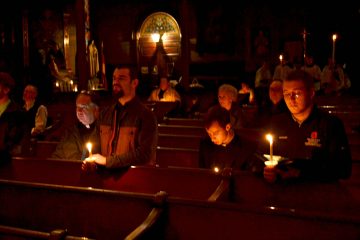A Call to Spiritual Arm
(Note: The first installment of this 3-part series can be found in the November 2025 issue.)
Some heard it as a child. Others were well into adulthood amid a lucrative career and serious relationship. That still small voice. That restless heart. That sense of emptiness
despite having everything they thought they ever wanted. “Not me, Lord! Please! I want to get married. I want to have children. I love my girlfriend.” The road to the priesthood is not for the faint-of-heart. It can take years of intense prayer and spiritual direction for a man to discern that God is indeed inviting him to apply to the seminary. By the time they reach this point, no illusions remain. They know what they are giving up: the house, the career, the income, the fiancée, their freedom.
“[But] whatever gains I had, these I have come to consider a loss because of Christ. More than that, I even consider everything as a loss because of the supreme good of knowing Christ Jesus my Lord. For his sake I have accepted the loss of all things and I consider them so much rubbish, that I may gain Christ and be found in him … to know him and the power of his resurrection and [the] sharing of his sufferings by being conformed to his death” (Phil 3:7-10).
The seminary application process leaves little unrevealed: an autobiographical essay, letters of recommendation, a thorough psychological evaluation, a background check, an interview before a panel of seminary priests and professors. All is laid open. It matters not. They have found their Lord, and He is bidding them to come. They will lay down their lives for Him and His sheep. The gate opens. They enter. And it hits them: they too are one of the lambs and so is everyone else in the building … and lambs can be annoying! The constant clanging of the bells around their necks, their incessant “Baa Baa,” their off-key singing, their poor table manners … “Really, Lord?!?”
“Really, my son. Only seven years to go.”
During this spiritual boot camp, seminarians will experience extensive human, intellectual, pastoral, and spiritual formation. They will study philosophy, theology, Latin, music, and business. They will engage in apostolic works; participate in physical labor by maintaining the seminary grounds; and take on part-time jobs, such as working in the seminary library or caring for ill classmates and priests. All of these activities are set within a strict schedule that places daily Mass, the Liturgy of the Hours, and other communal and personal prayer at its center. Regular spiritual direction and assessment by the formators help discern the seminarian’s progress in cultivating a life of obedience, celibacy, and simplicity. At their seminary training’s conclusion, candidates for the priesthood have earned a master’s degree in divinity (and, if they choose, in an additional area of specialization).
Upon ordination, most will be assigned to a parish as a parochial vicar until the (arch)bishop elevates him to the office of pastor.
They’ve survived the arduous training, but now the real campaign unfolds. The enemy has placed a target squarely on their backs and they know it. Spiritual missiles will be launched at them from within and without, but they refuse to be deterred.
Next time, we will explore some of the spiritual battles that these chosen men must engage in and how the laity play an integral role in supporting them. ✣
Dr. Nicole Best is a clinical psychologist and member of the Archdiocese’s Priest-Care Initiative, which provides ongoing education and support to our local priests.















